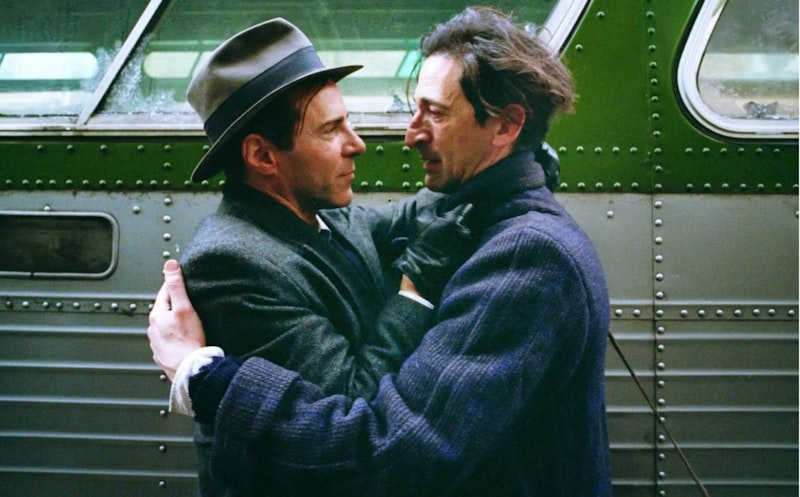When The Brutalist premiered last summer at the Venice Film Festival, it was hailed as an “instant classic,” a shoo-in at the Oscars and all other major awards, and, as the posters and trailers and all advertising scream, “a monument to the majesty of the movies.” Ever since theaters reopened after the pandemic and film production resumed, there’s been a disturbing trend mostly centered in the United States: new movies look and feel like fake movies that would exist in the reality of movies from past decades—for a recent example, Breezy in Licorice Pizza; there are many in Tropic Thunder, but Simple Jack is certainly the most “famous;” as far as movies about movies go, there’s Mr. Lovejoy in Get Shorty, and, among many others, The Fourteen Fists of McClusky in Once Upon a Time in Hollywood.
That last example was a riff on Quentin Tarantino’s own Inglourious Basterds, and it’s a testament to his abilities that The Fourteen Fists of McClusky looks just as good as if not FAR BETTER than the late-1960s George Peppard studio movies that it draws from. In Ben Stiller’s case, Tropic Thunder deftly made fun of the crassness of the late-2000s, mocking Oscar-bait with Robert Downey Jr.’s legendary performance in blackface along with the gross-out comedies of his peers (although by 2008, Adam Sandler and Steve Brill had been largely supplanted in cultural significance, if not commercially, by Judd Apatow’s syndicate). Stiller waffles now on whether or not he could make Tropic Thunder today, but the truth is that you “couldn’t make” that movie in 2008, just as Tarantino “couldn’t make” his first two movies in the early-1990s—he did, and succeeded because of it. This was new, bold, provocative work from an original artist which didn’t resemble anything surrounding it or anything which came before.
But these movies in particular need a movie culture to mock in the first place: without steady production in all genres, absent too much self-awareness, there’s no healthy movie culture. It just becomes yet another niche for a certain kind of person to fall into, rather than the unifying force that it’s been since the turn of the 20th century. The lack of imagination in America and the world broadly since the advent of smartphones has decimated common intelligence and basic daily functioning, and it’s surprising our movies aren’t worse than they are. But don’t get excited: The Brutalist is yet another unfortunate addition to the fake movies of the 2020s list, and the common criticism is true: producer/director Brady Corbet is all affectation and scaffolding, attempting an epic on the scale and of the depth of Paul Thomas Anderson’s There Will Be Blood, but he just doesn’t have it.
You can admire his ambition, but that only gets you so far. The much-talked about second half of the movie is a bit better than the widely-praised first half, but it all amounts to the same feeling you get walking out of a James Bond movie—less, James Bond is really cool—maybe Jason Bourne. It’s just empty, the idea of a prestige picture with the idea of a Best Actor performance by Adrien Brody (who spends most of the movie’s 215 minutes looking like the big eyes emoji) and a script, co-written by Corbet and Mona Fastvold, with the subtlety of a sledgehammer. More distressing, Corbet has no tics, no eccentricities, no marks to identify or differentiate him from any other director, which is fine if you’re making program pictures, but this guy and his movie are supposed to be all that this season.
The entertainment press is elevating lesser work to gild their own hopes and hang on to the jobs that they have while they can. As common intelligence continues to fall, ersatz work like The Brutalist will be breathlessly praised because people are starved for something interesting, and because, eventually, they won’t know the difference. I saw There Will Be Blood 17 years ago this month in the same theater as I saw The Brutalist; I went to both with my dad, and while he liked The Brutalist, we were both blown away by Anderson’s masterpiece, and agree that Corbet’s film doesn’t touch it. He’s not even in the same building—who is, now?
The use of generative A.I. in adjusting spoken Hungarian and rendering architectural exhibits towards the end makes me as queasy as everyone else, and that’ll be what keeps the movie from winning any major Oscars (besides Academy voters falling asleep before the second half). But while that bothers me, what’s worse is how fallow this film has proven to be after so many months of hype. I won’t accept a declining standard in American cinema, no matter how obliterated our culture becomes. This movie is retread after retread, cliche on top of cliche, all amounting to an inert, impersonal artifact that doesn’t even function as a statement—if only it could be used as a piece of architecture. For now, it’s just pounds and pounds of 70mm film that won’t be remembered, referenced, or influential in the next 10 years. This is mimicry and, frankly, inedible. Of course we’re getting sick: regurgitation is a suicidal diet.
—Follow Nicky Otis Smith on Twitter and Instagram: @nickyotissmith

